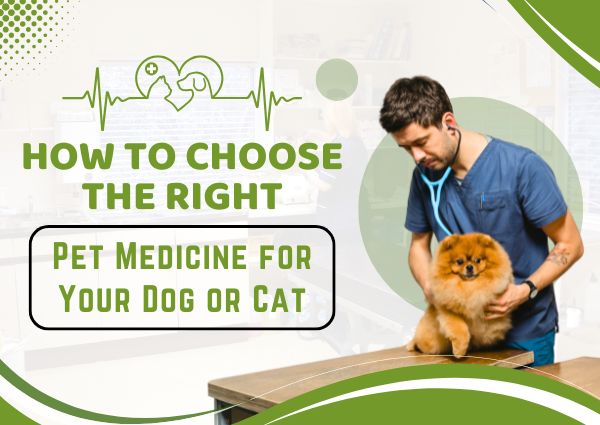With so many options available — from vet-prescribed drugs to over-the-counter supplements — making the right choice requires careful attention. Giving the wrong medication can worsen the condition or cause unexpected side effects.
So how do you know which medicine is right for your pet? This guide from Amino Pharma breaks it down step-by-step to help you make safe, informed decisions for your beloved companions.
1. Always Start With a Veterinarian’s Diagnosis
Before reaching for any medicine, always consult a qualified veterinarian. Self-diagnosing based on internet searches or symptoms can lead to misjudgment and delayed treatment.
A vet will:
- Conduct proper physical examinations
- Recommend diagnostic tests if needed
- Accurately identify the root cause
- Prescribe safe, species-specific medicines
Never skip this first and essential step. Even seemingly mild issues like itching or lethargy may indicate deeper health problems.
2. Understand The Type Of Medicine Your Pet Needs
Not all pet medications are created equal. The right choice depends on the type of condition being treated. Here’s a quick breakdown:
- Antibiotics – For bacterial infections like UTIs or skin wounds
- Dewormers – To treat internal parasites like roundworms, hookworms, tapeworms
- Anti-fungal/Anti-itch creams – For fungal infections and skin irritations
- Vitamins and Supplements – For coat health, joint support, immunity
- Pain Relievers/NSAIDs – For inflammation or post-surgery recovery
- Heartworm & Flea Preventives – For preventive protection
Always check the active ingredients and match them with your vet’s advice.
3. Choose Species-Specific Formulations
A major mistake many pet parents make is using dog medication for cats or vice versa. This can be extremely dangerous. Some drugs that are safe for dogs are toxic to cats, and the dosage requirements are completely different.
For example:
- Paracetamol (acetaminophen) is safe for humans but deadly for cats
- If given to cats, dog flea treatments can be lethal.
Make sure the label clearly states “For Dogs” or “For Cats” and never interchange them without veterinary approval.
4. Check The Brand’s Credibility
When buying pet medication, always go with reputed, veterinary-certified brands. As a pet pharma leader, Amino Pharma ensures that all our products are:
- Scientifically formulated and lab-tested
- Approved by veterinary drug authorities
- Manufactured under strict quality control
- Recommended by professional veterinarians across India
Avoid cheap or unverified online products. Always look for certified labels, batch numbers, and expiry dates.
5. Watch For Allergies Or Reactions
Just like humans, pets may react to certain ingredients or new medications. Keep an eye out for:
- Vomiting or diarrhea
- Swelling or rashes
- Lethargy or changes in behavior
- Loss of appetite
If you notice anything unusual, stop the medication and call your vet immediately.
It’s also wise to introduce new medicine slowly, especially if it’s a dietary supplement or preventive product.
6. Dosage Matters — Stick To It
The correct dosage is vital. It depends on your pet’s:
- Species (dog or cat)
- Breed
- Weight
- Age
- Health condition
Overdosing or underdosing can both lead to complications. Observe the dose chart on the box or the prescription from your veterinarian. For liquids or pills, use vet-approved measuring tools — not home teaspoons.
7. Choose The Right Form For Easy Administration
Medicines for pets come in many forms:
- Tablets (flavored or plain)
- Liquid syrups
- Topical creams
- Chewables
- Injectables (administered by vets)
If your pet resists pills, you can ask your vet for alternatives like flavored chewables or liquids. Many Amino Pharma products are designed to be palatable and easy to give.
8. Preventive Care Is Better Than Reactive Treatment
While it’s crucial to treat illnesses promptly, preventive care keeps your pet healthier long-term. These include:
- Deworming every 3–6 months
- Tick/flea prevention every month
- Heartworm preventives
- Joint supplements in aging pets
Consult your vet about a preventive care calendar, and choose high-quality, long-acting preventive products.
9. Store Pet Medicines Properly
To maintain their effectiveness, store pet medications:
- Away from sunlight
- In cool, dry places
- Children and pets cannot reach it.
Some products (like vaccines or probiotics) may need refrigeration. For information on how to store it properly, read the label.
When in doubt, always talk to your vet, check labels thoroughly, and choose products from trusted names in the pet healthcare space.

